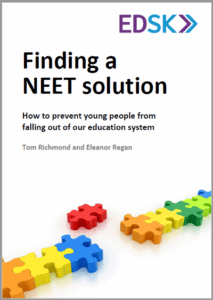A young person being ‘Not in Education, Employment or Training’ (NEET) can be particularly harmful and have long-term ‘scarring’ effects. Individuals who spend time NEET are more likely to be unemployed, receive lower wages, have a criminal record, report lower levels of life satisfaction and job satisfaction and suffer from health problems such as depression. At the end of 2021 there were over 700,000 16 to 24-year-olds classified as NEET in England – equivalent to 1-in-10 young people. Worse still, despite endless initiatives and interventions from successive governments, the proportion of young people who are NEET after leaving school or college stands at 12.6 per cent – just 0.4 per cent lower than in 2016, and only 0.7 per cent lower than two decades earlier.
Far from being a homogenous group, there are many reasons why a young person may become detached from education, employment and training. Only around 40 per cent of young people recorded as NEET are currently ‘unemployed’, with the remaining 60 per cent being ‘economically inactive’ (e.g. long-term or temporarily sick due to poor physical and / or mental health; looking after their family or home). Previous reviews have often presented a long list of characteristics that are associated with being NEET, such as poor school attendance and behaviour or having learning difficulties. However, from a policymaking perspective, it is more important to focus on factors that are predictive of future NEET status rather than merely correlating with it.


